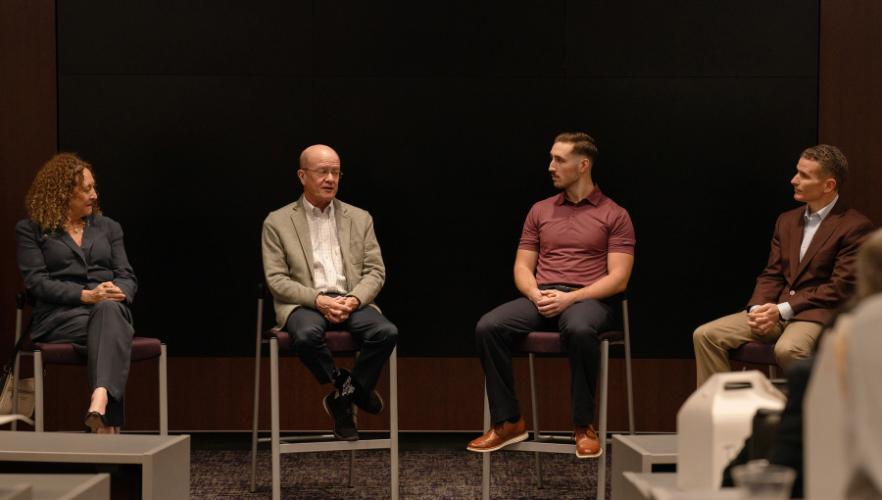NACOGDOCHES, Texas — Stephen F. Austin State University students attending this semester’s banking and wealth management career exploration day in March at the Nelson Rusche College of Business don’t necessarily know what they want to do yet, but they do know they want to help people.
“Many of this generation’s students want to know how to make a difference in their communities,” said David Kaiser, director of SFA’s Chadwick Banking Program and moderator for the event’s panel discussion. “Like physicians help their patients manage their physical health, banking and wealth management professionals help their clients manage their financial health. This assistance extends to businesses and whole communities.”
For the event, four panelists spoke to students about the diverse career opportunities available in the banking and wealth management industries, as well as how the companies for which they work contribute to community growth and support.
Two of the panelists, Francis Spruiell, executive vice president of Austin Bank in Nacogdoches and president of Austin Bank’s piney woods region, and Weston Reynolds, wealth management and trust manager at Commercial Bank in Nacogdoches, work for community banks that have each served the region for more than a century. Their banks support community efforts, from teaching local eighth graders financial literacy to helping with the Angelina County Fair.
“Our employers encourage us to do this, and there’s nothing more rewarding,” Spruiell said.
Panelist Gregg Nichols, a financial advisor with Edward Jones who worked as a banker for 15 years, said those in the field are “always looking to help people by building relationships with them and solving their financial puzzles through those relationships.”
Dr. Matthew Jaramillo, SFA lecturer of finance, was in the audience and added, “Studies have shown that career satisfaction scores range from high to very high in the financial advising field, particularly driven by working closely with individuals on achieving client goals. SFA students who complete the financial planning minor are industry ready immediately upon entering the workforce.”
Part of establishing the long-term relationships needed to achieve financial planning goals is building trust over generations of a family and through the right education and credentials, said Nichols, who just completed the Certified Financial Planner exam.
The Rusche College of Business offers courses to help students prepare for the CFP, which ensures financial professionals are highly qualified to develop a holistic plan for their clients’ finances.
In addition to working with wealth managers, registered investment advisors and holistic financial planners, almost every bank has at least one department that is impacted by the financial planning process, Jaramillo said.
Tom Heslep, a 1981 SFA graduate and the chief lending officer of Texas Republic Bank in Dallas, added that patience and listening skills are keys to success in this career.
“You have to care,” Heslep said. “The conversations you have with your clients are not always easy. It takes a certain character to get through those conversations.”
An individual does not necessarily have to be a numbers person or a people person to thrive in a banking career, said Spruiell, who majored in computer science in college.
“If you’re not an extrovert, you still have opportunities in banking such as attorneys and accountants,” Spruiell said. “There are also human resources positions and training positions. You just need to get your feet wet and start somewhere so you can see what you like.”
Heslep added, “Banking is probably the most diverse industry today. It’s not just loaning and collecting money. By connecting with industry professionals through your professors and completing internships, you can showcase your potential, interests and skills.”
For more information on SFA’s Chadwick Banking Program, visit the website.
ABOUT STEPHEN F. AUSTIN STATE UNIVERSITY
Stephen F. Austin State University, the newest member of The University of Texas System, began a century ago as a teachers’ college in Texas’ oldest town, Nacogdoches. Today, it has grown into a regional institution comprising six colleges — business, education, fine arts, forestry and agriculture, liberal and applied arts, and sciences and mathematics. Accredited by the Southern Association of Colleges and Schools, SFA enrolls approximately 11,000 students while providing the academic breadth of a state university with the personalized attention of a private school. The main campus encompasses 421 acres that include 37 academic facilities, nine residence halls, and 68 acres of recreational trails that wind through its six gardens. The university offers more than 80 bachelor’s degrees, more than 40 master’s degrees and four doctoral degrees covering more than 120 areas of study. Learn more at the SFA website.
 Axe ’Em, Jacks!
Axe ’Em, Jacks!
